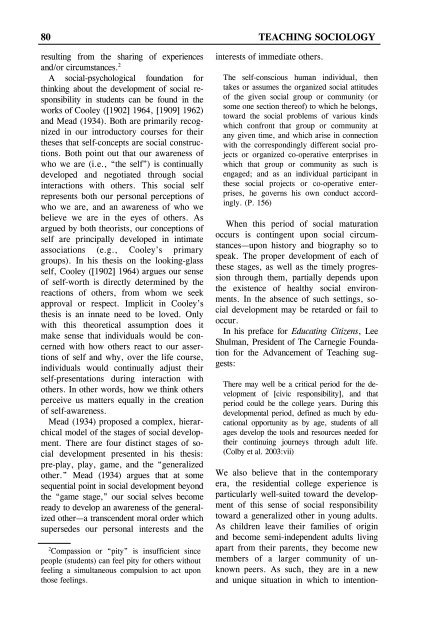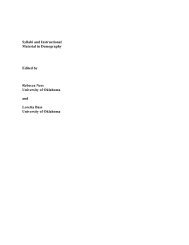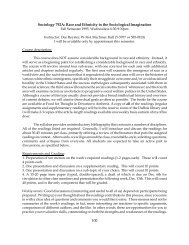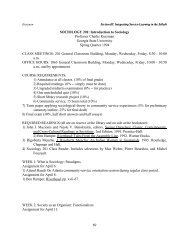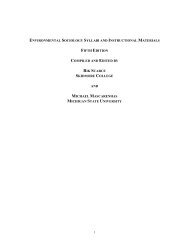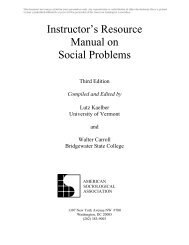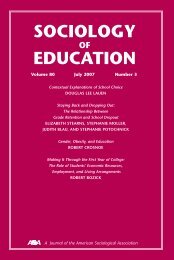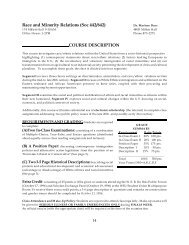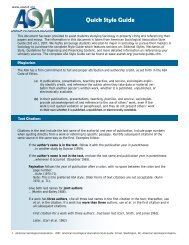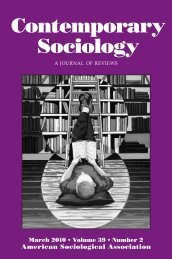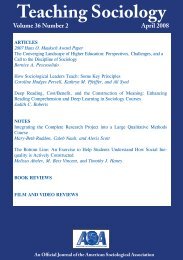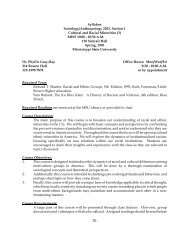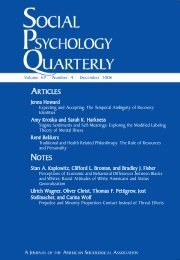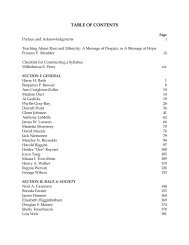Teaching Sociology - American Sociological Association
Teaching Sociology - American Sociological Association
Teaching Sociology - American Sociological Association
Create successful ePaper yourself
Turn your PDF publications into a flip-book with our unique Google optimized e-Paper software.
80 TEACHING SOCIOLOGY<br />
resulting from the sharing of experiences<br />
and/or circumstances. 2<br />
A social-psychological foundation for<br />
thinking about the development of social responsibility<br />
in students can be found in the<br />
works of Cooley ([1902] 1964, [1909] 1962)<br />
and Mead (1934). Both are primarily recognized<br />
in our introductory courses for their<br />
theses that self-concepts are social constructions.<br />
Both point out that our awareness of<br />
who we are (i.e., “the self”) is continually<br />
developed and negotiated through social<br />
interactions with others. This social self<br />
represents both our personal perceptions of<br />
who we are, and an awareness of who we<br />
believe we are in the eyes of others. As<br />
argued by both theorists, our conceptions of<br />
self are principally developed in intimate<br />
associations (e.g., Cooley’s primary<br />
groups). In his thesis on the looking-glass<br />
self, Cooley ([1902] 1964) argues our sense<br />
of self-worth is directly determined by the<br />
reactions of others, from whom we seek<br />
approval or respect. Implicit in Cooley’s<br />
thesis is an innate need to be loved. Only<br />
with this theoretical assumption does it<br />
make sense that individuals would be concerned<br />
with how others react to our assertions<br />
of self and why, over the life course,<br />
individuals would continually adjust their<br />
self-presentations during interaction with<br />
others. In other words, how we think others<br />
perceive us matters equally in the creation<br />
of self-awareness.<br />
Mead (1934) proposed a complex, hierarchical<br />
model of the stages of social development.<br />
There are four distinct stages of social<br />
development presented in his thesis:<br />
pre-play, play, game, and the “generalized<br />
other.” Mead (1934) argues that at some<br />
sequential point in social development beyond<br />
the “game stage,” our social selves become<br />
ready to develop an awareness of the generalized<br />
other—a transcendent moral order which<br />
supersedes our personal interests and the<br />
2 Compassion or “pity” is insufficient since<br />
people (students) can feel pity for others without<br />
feeling a simultaneous compulsion to act upon<br />
those feelings.<br />
interests of immediate others.<br />
The self-conscious human individual, then<br />
takes or assumes the organized social attitudes<br />
of the given social group or community (or<br />
some one section thereof) to which he belongs,<br />
toward the social problems of various kinds<br />
which confront that group or community at<br />
any given time, and which arise in connection<br />
with the correspondingly different social projects<br />
or organized co-operative enterprises in<br />
which that group or community as such is<br />
engaged; and as an individual participant in<br />
these social projects or co-operative enterprises,<br />
he governs his own conduct accordingly.<br />
(P. 156)<br />
When this period of social maturation<br />
occurs is contingent upon social circumstances—upon<br />
history and biography so to<br />
speak. The proper development of each of<br />
these stages, as well as the timely progression<br />
through them, partially depends upon<br />
the existence of healthy social environments.<br />
In the absence of such settings, social<br />
development may be retarded or fail to<br />
occur.<br />
In his preface for Educating Citizens, Lee<br />
Shulman, President of The Carnegie Foundation<br />
for the Advancement of <strong>Teaching</strong> suggests:<br />
There may well be a critical period for the development<br />
of [civic responsibility], and that<br />
period could be the college years. During this<br />
developmental period, defined as much by educational<br />
opportunity as by age, students of all<br />
ages develop the tools and resources needed for<br />
their continuing journeys through adult life.<br />
(Colby et al. 2003:vii)<br />
We also believe that in the contemporary<br />
era, the residential college experience is<br />
particularly well-suited toward the development<br />
of this sense of social responsibility<br />
toward a generalized other in young adults.<br />
As children leave their families of origin<br />
and become semi-independent adults living<br />
apart from their parents, they become new<br />
members of a larger community of unknown<br />
peers. As such, they are in a new<br />
and unique situation in which to intention-


